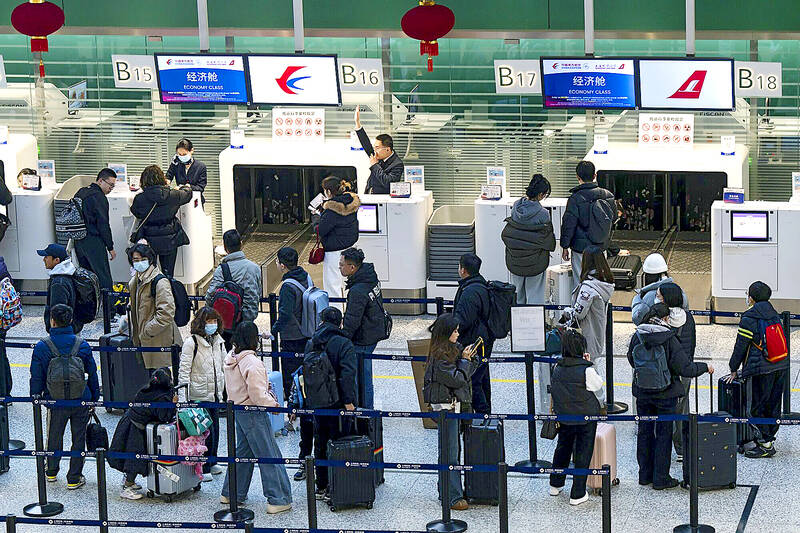Train stations and airports across China saw the biggest peak in travelers yesterday ahead of the Lunar New Year, as millions of people returned home to spend the holidays with their families in an annual migration that is expected to be a record.
The Lunar New Year, the Year of the Snake, begins on Wednesday.
The Chinese enjoy eight consecutive public holidays, an opportunity to share festive meals with family, attend traditional performances or set off firecrackers and fireworks.

Photo: Bloomberg
At Beijing West Station, an Agence France-Presse journalist yesterday saw thousands of travelers wrapped up in parkas, many wearing face masks to avoid catching anything on packed trains, dragging their suitcases through the hallways before boarding the carriages.
During the traditional 40-day period that runs before, during and after the holidays, about 9 billion interprovincial passenger trips, on all forms of transport combined, are expected to be made, the official Xinhua news agency reported.
Train and air travel are expected to “hit record highs” during this year’s migration, it said.
The Chinese Ministry of Transport said it expects 510 million train trips and 90 million air trips during the period.
The national railway company, which has added thousands of trains to meet demand, said yesterday was “the main peak” at stations before the holidays.
It said it used data from ticket sales and waiting lists to predict and regulate supply.
With many people working and studying in provinces other than their own because of better opportunities, there is a large population migration around the New Year holiday.
Many factories have already closed for the holiday, with such workers traditionally returning home earlier than the rest of the population.
While train travel was still an epic journey even 10 years ago, sometimes lasting several days, the rapid development of an efficient and comfortable high-speed network has made travel much simpler.

MONEY GRAB: People were rushing to collect bills scattered on the ground after the plane transporting money crashed, which an official said hindered rescue efforts A cargo plane carrying money on Friday crashed near Bolivia’s capital, damaging about a dozen vehicles on highway, scattering bills on the ground and leaving at least 15 people dead and others injured, an official said. Bolivian Minister of Defense Marcelo Salinas said the Hercules C-130 plane was transporting newly printed Bolivian currency when it “landed and veered off the runway” at an airport in El Alto, a city adjacent to La Paz, before ending up in a nearby field. Firefighters managed to put out the flames that engulfed the aircraft. Fire chief Pavel Tovar said at least 15 people died, but

LIKE FATHER, LIKE DAUGHTER: By showing Ju-ae’s ability to handle a weapon, the photos ‘suggest she is indeed receiving training as a successor,’ an academic said North Korea on Saturday released a rare image of leader Kim Jong-un’s teenage daughter firing a rifle at a shooting range, adding to speculation that she is being groomed as his successor. Kim’s daughter, Ju-ae, has long been seen as the next in line to rule the secretive, nuclear-armed state, and took part in a string of recent high-profile outings, including last week’s military parade marking the closing stages of North Korea’s key party congress. Pyongyang’s official Korean Central News Agency (KCNA) released a photo of Ju-ae shooting a rifle at an outdoor shooting range, peering through a rifle scope

South Korea would soon no longer be one of the few countries where Google Maps does not work properly, after its security-conscious government reversed a two-decade stance to approve the export of high-precision map data to overseas servers. The approval was made “on the condition that strict security requirements are met,” the South Korean Ministry of Land, Infrastructure and Transport said. Those conditions include blurring military and other sensitive security-related facilities, as well as restricting longitude and latitude coordinates for South Korean territory on products such as Google Maps and Google Earth, it said. The decision is expected to hurt Naver and Kakao

India and Canada yesterday reached a string of agreements, including on critical mineral cooperation and a “landmark” uranium supply deal for nuclear power, the countries’ leaders said in New Delhi. The pacts, which also covered technology and promoting the use of renewable energy, were announced after Indian Prime Minister Narendra Modi and Canadian Prime Minister Mark Carney hailed a fresh start in the relationship between their nations. “Our ties have seen a new energy, mutual trust and positivity,” Modi said. Carney’s visit is a key step forward in ties that effectively collapsed in 2023 after Ottawa accused New Delhi